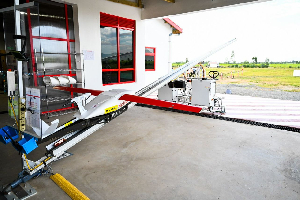A recent impact assessment study on aerial logistics to improve maternal health and emergencies has revealed a remarkable reduction in maternal mortality by 56.4% in Ghana's Ashanti Region, thanks to the collaborative efforts of Zipline and the Ghana Health Service (GHS).
This was revealed at the National Ghana Health Service Research Conference organized by the Ghana Health Service in partnership with Zipline.
The study, which focused on the impact of aerial logistics in healthcare, also noted a 19.9% increase in antenatal visits and a 25% rise in in-facility births, signaling a significant boost in maternal health outcomes.
The success according to the study is attributed to the on-demand availability of blood and essential medical supplies provided by Zipline's innovative drone delivery system.
This consistent access to critical resources has increased patient confidence in the healthcare system, encouraging more mothers to seek necessary care throughout their pregnancies.
Speaking on the highlight of the study, the Research Officer at Ashanti Regional Health Directorate stated, "The significant decrease in maternal mortality we've seen is a clear indication of the vital role that reliable access to medical supplies plays in healthcare.
The ability to deliver blood and essential medicines exactly when they're needed has transformed how mothers in the Ashanti Region perceive and engage with the healthcare system.
It's an achievement that speaks to the importance of introducing technology in healthcare delivery. Mothers now feel more confident in seeking care, knowing that they will receive the support they need throughout their pregnancies."
The study examined data from 191 health facilities, including hospitals, health centers, and Community-based Health and Planning Services (CHPS) Compounds.
Among these, 99 facilities were served by Zipline’s aerial logistics, while 91 were not.
The research employed adjusted rates for various key indicators, such as antenatal consultations, emergency visits, referrals, live births, hysterectomies, maternal deaths, and neonatal deaths, as the main dependent variables.
The qualitative aspect of the study aimed to describe and analyze the changes in satisfaction levels among healthcare providers and patients perceived quality of care in maternal health and emergencies, and experiences related to the use of aerial logistics.
In-depth interviews were conducted with 22 patients and 23 healthcare providers at the participating facilities.
Globally, maternal mortality remains a critical public health challenge, with stark disparities between high-income and low-to-middle-income countries (LMICs).
According to the World Health Organization (WHO), the majority of maternal deaths occur in LMICs, often due to preventable causes.
In Ghana, particularly in the Ashanti Region, the problem is critical, reflecting the broader challenges faced across the African continent.
Beyond this, socio-economic, geographic, and infrastructural factors intensify the risks associated with pregnancy and childbirth, highlighting the urgent need for innovative solutions to improve maternal health outcomes.
As maternal mortality continues to pose a challenge in low-to-middle-income countries, the success seen in Ghana's Ashanti Region offers a promising model for other regions and nations striving to improve maternal health outcomes through innovative solutions.
Zipline is poised to continue leading the way in revolutionizing healthcare delivery, ensuring that every mother has access to the life-saving resources, no matter where she lives.
Health News of Thursday, 12 September 2024
Source: peacefmonline.com













